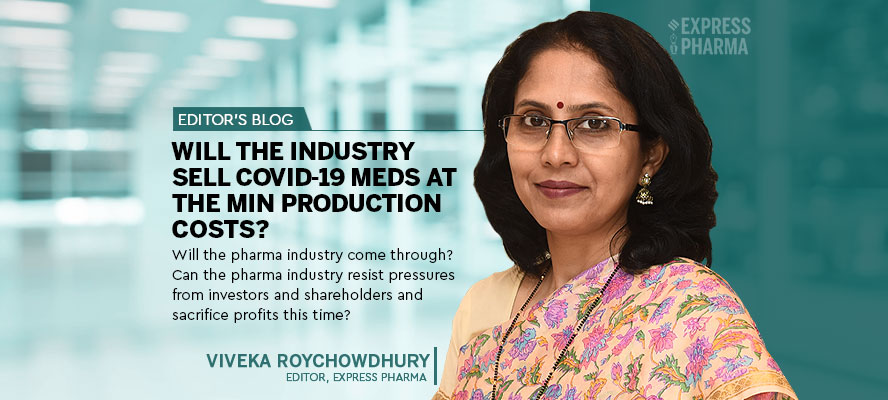Will the industry sell COVID-19 meds at the min production costs?
Will the pharma industry come through? Can the pharma industry resist pressures from investors and shareholders and sacrifice profits this time?
A recent study by Andrew Hill et al in the Journal of Virus Eradication projects the minimum costs to manufacture new treatments for COVID-19. Given that most of these are not new medicines but ‘repurposed’ existing medicines, the authors estimated the minimum costs of production from the costs of active pharmaceutical ingredients (APIs) using established methodology, which had good predictive accuracy for medicines for hepatitis C and HIV amongst others. Data were extracted from global export shipment records or analysis of the route of chemical synthesis. The estimated costs were compared with list prices from a range of countries where pricing data were available.
Hill et al estimated that the minimum costs of production were $0.93/day for remdesivir, $1.45/day for favipiravir, $0.08/day for hydroxychloroquine (HCQ), $0.02/day for chloroquine, $0.10/day for azithromycin, $0.28/day for lopinavir/ritonavir, $0.39/day for sofosbuvir/daclatasvir and $1.09/day for pirfenidone. Costs of production ranged between $0.30 and $31 per treatment course (10–28 days). The authors point out that the current prices of these drugs were far higher than the costs of production, particularly in the US.
At these low production costs, there is no doubt that pharma companies can price these off-patent generic drugs competitively and yet make enough profits, without running into losses. There is no doubt that this study will be used by policymakers in governments to drive tough price negotiations to ‘help ensure affordable access to vital treatment for COVID-19 at low prices globally’, as the study notes in its conclusion.
However, prices of APIs are currently higher than normal, thanks to supply chain disruption. Freight rates are also higher than normal as governments are wary about consignments coming in from pandemic hotspots.
Zydus Cadila and IPCA the major manufacturers of HCQ in the country have ramped up production to meet the orders from state governments as HCQ has been prescribed as a prophylactic for frontline healthcare workers. Pankaj Patel, Chairman, Zydus Cadila has gone on record to state that his company will be supplying the ICMR at a price lower than the government regulated price, that is a little less than Rs 3 per tablet. The company has also proactively stopped HCQ exports for now to focus on meeting domestic needs.
Médecins Sans Frontières/Doctors Without Borders (MSF) welcomes this important pricing study highlighting that potential medicines for the treatment of COVID-19 could be made available to all at affordable prices during this pandemic.
As Jessica Burry, Pharmacist, Médecins Sans Frontières/Doctors Without Borders (MSF) Access Campaign puts it, “… now is not the time for price gouging and pandemic profiteering. Patents and monopolies will only result in limited supply and unnecessarily high prices. Rationing drugs because of high prices and limited supply will only serve to prolong the pandemic. What good is a lifesaving drug if you can’t afford it?”
Can the pharma industry resist pressures from investors and shareholders and sacrifice profits this time? This will be the litmus test. After all, investors and shareholders are not immune from the coronavirus. The reward might be long in coming but will be worth it: a chance to regain patient trust.
- Advertisement -



We @ Rolls Pack Pvt Ltd supply the packaging for HCQ API and are committed to keep the Supply chain functioning during Lockdown period!!!
Jai Hind!!!!
—-CA ashesh s. ghose / Mum-80